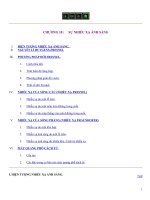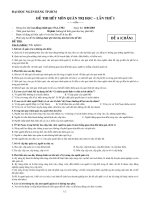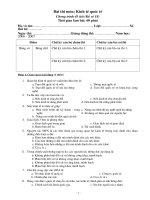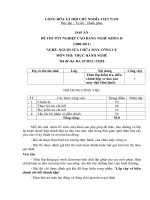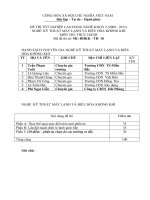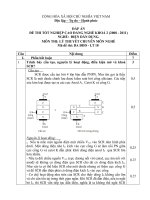PASSAGE 18
Bạn đang xem bản rút gọn của tài liệu. Xem và tải ngay bản đầy đủ của tài liệu tại đây (40.96 KB, 3 trang )
PASSAGE 18
These days, most people in Britain and the US do not wear very formal clothes. But sometimes it is
important to wear the right thing.
Many British people don't think about clothes very much. They just like to be comfortable. When they
go out to enjoy themselves, they can wear almost anything. At theatres, cinemas and concerts you can put
on what you like from elegant suits and dresses to jeans and sweaters. Anythin g goes, as long as you
look clean and tidy.
But in Britain, as well as in the US, men in offices usually wear suits and ties, and women wear dresses
or skirts (not trousers). Doctors, lawyers and business people wear quite formal clothes. And in some
hotels and restaurants men have to wear ties and women wear smart dresses.
In many years, Americans are more relaxed than British people, but they are more careful with their
clothes. At home, or on holiday, most Americans wear informal or sporty clothes. But when they go out in
the evening, they like to look elegant. In good hotels and restaurants, men have to wear jackets and ties,
and women wear pretty clothes and smart hairstyles.
It is difficult to say exactly what people wear informal or formal in Britain and the US, because
everyone is different. If you are not sure what to wear, watch what other people do and then do the same.
You'll feel more relaxed if you don't look too different from everyone else.
Question 1. Many British people wear freely when they__________.
A. attend lectures
B. attend meetings
C. spend their spare time D. work in offices
Question 2. Who doesn’t usually wear suits and ties?
A. lawyers
B. doctors
C. drivers
D. businessmen
Question 3. If you visit an American friend at home in the evening, you may find that your friend wears
_________.
A. pretty clothes
B. formal clothes
C. dirty clothes
D. informal clothes
Question 4. If you are in a foreign country, the best way the writer suggests to you is to wear
A. strange clothes
B. as the people there do C. your native clothes
D. comfortable clothes
Question 5. The word “they” in paragraph 4 refers to ________.
A. American peple
B. british people
C. men
D. women
Question 6. The word “elegant” is closest in meaning to _______.
A. Decent
B. confident
C. comfortable
D. neat
Question 7. What do you think the passage is mainly about ?
A. Recent dressing habits in Great Britain and the United States.
B. The reason why informal clothing is popular in the UK and USA.
C. When we should wear in a formal way.
D. Where we should wear in a informal way.
Page 1
ĐÁP ÁN
1-C
2-C
6-A
7-A
3-B
4-B
5-A
LỜI GIẢI CHI TIẾT
Question 1:
Dẫn chứng ở câu thứ 3 đoạn 2” When they go out to enjoy themselves, they can wear almost
anything.’’, spare time: thời gian rỗi, giải trí
Question 2:
Dẫn chứng là câu đầu đoạn 4: “Doctors, lawyers and business people wear quite formal clothes.” Từ đó
loại ra
Question 3:
Dẫn chứng ở câu thứ 2 đoạn 4” At home, or on holiday, most Americans wear informal or sporty clothes’
Question 4:
Dẫn chứng ở gần câu đoạn cuối cùng: “If you are not sure what to wear, watch what other people do and
then do the same.” (nếu bạn ko biết mình nên mặc gì, quan sát những người ở đó và làm theo họ)
Question 5:
Chủ ngữ chính của câu đang là Americans vậy nên “they” thay thế cho chủ ngữ đó.
Question 6:
Đáp án A. elegent=decent: trang nhã, thanh lịch
Confident: tự tin
comfortable: thoải mái
neat: khéo léo, ngăn nắp
Question 7:
Ý chính của đoạn văn:
A.Thói quen ăn mặc của người Anh và Mĩ
B.Lí do trang phục bình thường phổ biến tại Mĩ và Anh
C.Khi nào chúng ta nên mặc trang phục trang trọng
D. Khi nào chúng ta nên mặc trang phục bình thường
Dịch bài:
Ngày nay, hầu hết người Anh và Mĩ ăn mặc không quá trang trọng, lễn nghi. Nhưng đôi khi, diện
đúng trang phục vào từng thời điểm là rẩt quan trọng
Nhiều người Anh không để tâm vào trang phục nhiều lắm. Họ chỉ thích cảm giác thoải mái. Khi ra
ngồi, họ có thể mặc hầu hết mọi kiểu đồ. Ở rạp chiếu phim, buổi hịa nhạc, bạn có thể diện từ bộ vét
trang nhã hay áo phông cùng quần jean đều ok, miễn sao bạn cảm thấy thoải mái, gọn gàng
Nhưng ở Anh, cũng như là Mĩ, đàn ông trong công sở thường mặc vét và thắt cà vạt, cịn phụ nữ
thì mặc váy cùng áo sơ mi (chứ không phải quần tây). Bác sĩ, luật sư và doanh nhân thường mặc đồ khá là
trang trọng. Và ở trong nhà hàng hay khách sạn, đàn ông phải thắt cà vạt và phụ nữ phải diện váy công sở
Page 2
Qua nhiều năm, người Mĩ đã thoải mái hơn người Anh trong khoản ăn mặc, nhưng họ vẫn rất cẩn
thận với việc mặc gì. Ở nhà hay đi nghỉ lễ, hầu hết người Mĩ đề mặc đồ thoải mái hoặc đồ chơi thể thao.
Nhưng nếu ra ngoài vào buổi tối thì trơng họ thật trang nhã. Trong những nhà hàng, khách sạn sang trọng,
đàn ông phải mặc vét thắt cà vạt, còn phụ nữ mặc đồ thanh lich cùng kiểu tóc gọn gàng, phù hợp
Thật khó để nói chính xác đồ mà người Anh hay Mĩ mặc là trang trọng hay bình thường bởi mọi
người đều có gu khác nhau. Nếu bạn ko chắc thứ mình nên mặc, hãy quan sát những người khác và làm
theo họ. Bạn sẽ thấy thoải mái hơn nếu không trông quá khác so với số đông
Page 3

